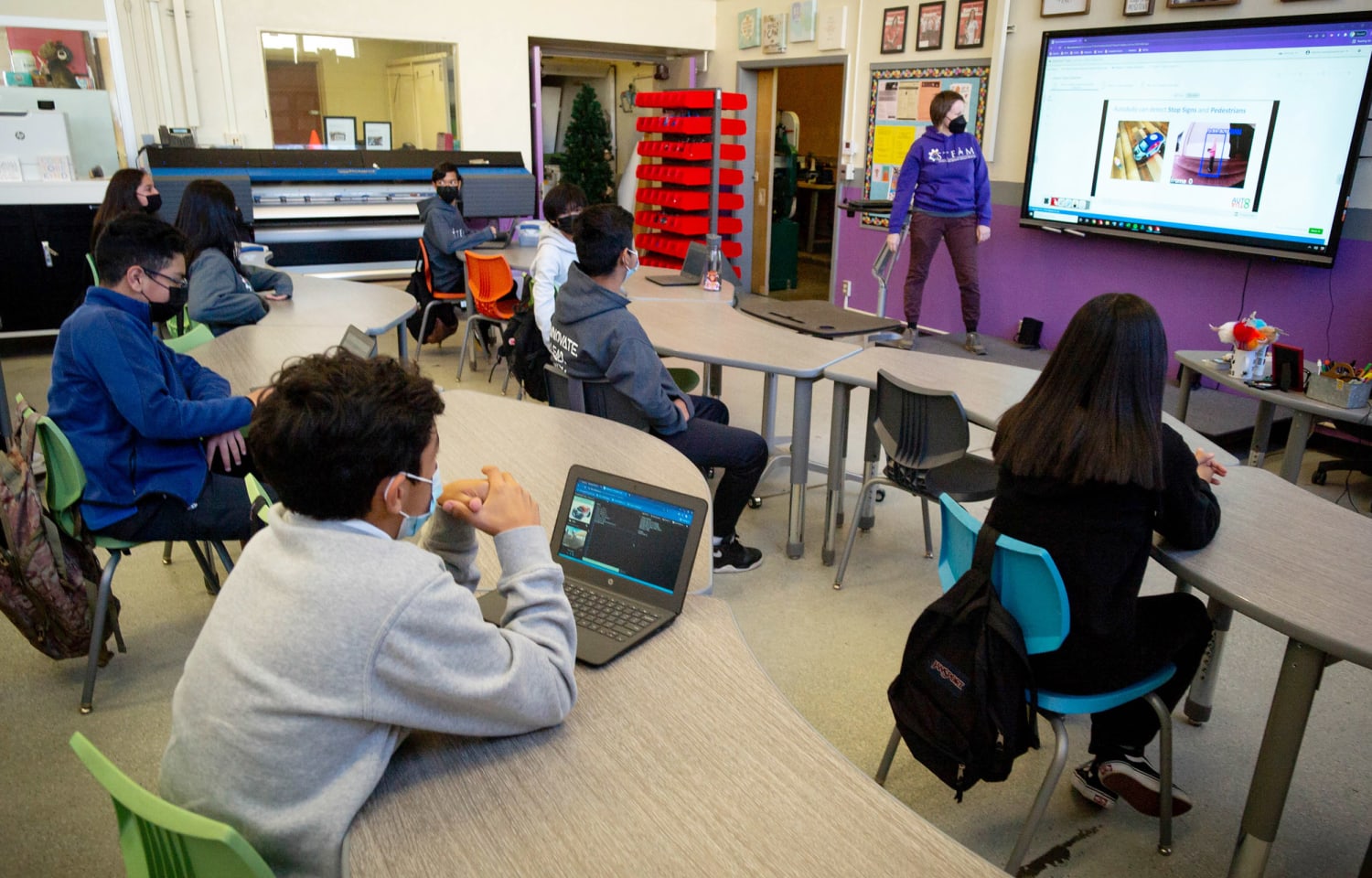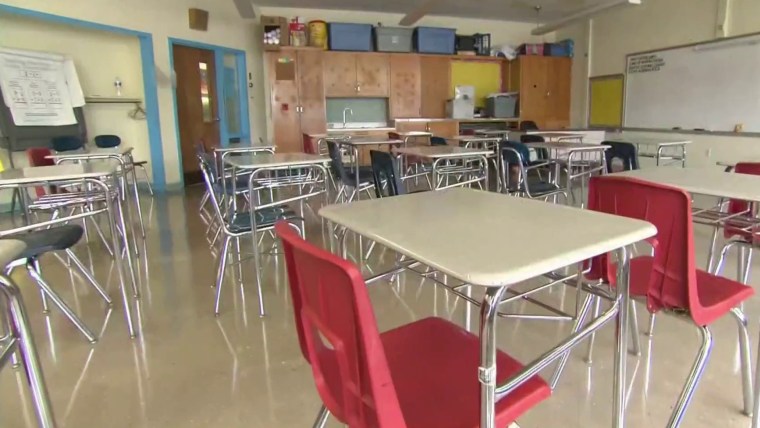When the staff thinned out to dire levels at his daughter’s school due to the pandemic last year, Craig Nilles heeded a robocall sent out by the principal soliciting parents to apply to be substitute teachers.
He was working from home as a paralegal and had a four-year degree the school required, so he signed up, went through a short training and began regularly substituting at Woodland Elementary School in Eagan, Minnesota.
“It is a unique way to give back and help the school that your children attended,” said Nilles, 39, who quit his paralegal job a few months after starting and is now a full-time substitute at the school. He also enrolled in a master’s program in education to become a full-fledged teacher.
He said it’s been one of the best experiences of his life but added the job is difficult and may not be something everyone is able to jump into easily.
Woodland Principal Lisa Carlson said she thought of the idea to send the call to all school families after coming up short of substitutes. Since the call went out last year, eight parents have joined the substitute roster, she said.
A number of schools across the country facing severe teacher shortages are sending unprecedented callouts to parents asking them to apply to be substitute teachers, but while the move might be a good quick fix to keep schools open for now, education experts say this model should not be used as a long-term solution for teacher shortages.
Schools in Idaho, Colorado, Texas, California and Massachusetts facing massive educator and substitute shortages have all dipped into parent pools over the last year to find candidates.
Substitute shortages had long preceded the pandemic with schools struggling to retain quality candidates, but with recent labor losses in fields across the spectrum and a surge in Covid-19 infections, an already dire situation has been exacerbated.
According to a report by the Rand Corp., a nonprofit research organization, that examined school district leaders’ views about staffing at the end of the 2020–2021 school year, as many as 8 in 10 wanted to increase the number of substitute teachers, and 6 in 10 are still working to do so.
But while parents stepping in as substitute teachers may work out well for some, it should still be viewed as a short-term fix, said Michael Hansen, a senior fellow in the Brown Center on Education Policy at the Brookings Institution.
“I think there’s a lot of things that can be justified in the service of trying to meet a public health emergency and keeping schools operational. I would say that’s more important than the quality of the substitute teacher standing in the front of the classroom for a few weeks,” he said. “What last year showed us is that it’s pretty critical to have schools open so that the rest of the economy can function as normal, and so there is a greater good that’s being serviced in this aspect.”
The nation is in a pandemic, and reaching out to parents gives schools a deeper bench to work with as substitute teacher ranks grow thin, he said. “It’s a friendly pool and a pool that is more interested and invested in the school.”
But Hansen fears the emergency measures could become permanent in schools that have struggled to keep teachers.
“A typical school, over the course of the year, is probably going to need more manpower than what parents can provide, and most schools would not be able to rely exclusively on that pool if it comes to that.”
It’s not necessarily problematic for the children’s experience, but it’s a much bigger warning flag about “our ability, as a society, as a school system to ensure that we’re really bringing talented people” into the classroom, both as regular teachers and as substitute teachers, he said.
Under most of these measures, parents are still required to formally apply and go through appropriate background checks, but some schools have waived traditional qualifications and certifications to make it easier to get them into classrooms.
At Hays Consolidated Independent School District, a public school district with more than 20,000 students in Kyle, Texas, the substitute teacher pool usually stands at 500 but the roster has now fallen to 300, said Tim Savoy, the chief communication officer for the school district. And this week, the school district had 292 requests for substitutes.
Normally, the school district requires substitute teachers to have 30 hours of college credit, but it is utilizing a provision that has never been used before to bypass that, he said.
“There is a provision that if a principal makes a recommendation for someone to be a substitute, then we can waive the 30 hours of college credit,” Savoy explained. “And so we thought, well, our principals know all of our parents, so let’s see if we can tap into that pool and maybe get some parents. And if they don’t happen to have the college requirement, then we can waive that right now.”
The school district has also raised the daily pay rate to further encourage parent participation.
Since the school sent an email to parents asking them to apply last week, only three have signed up, but “every little bit helps” during an emergency, Savoy said. Candidates will still be required to go through appropriate background checks, he said.
He added that the school district will go back to its normal standards and requirements once it has passed “this critical period.”
Heather Schwartz, a senior policy researcher at the Rand Corp., said asking parents to pitch in comes with a set of pros and cons but, during a critical time, this could act as “Band-Aid” for a bigger problem of shortages.
Parents are there to keep kids in schools but they are also giving isolated, one-off lessons without classroom management skills and extensive training, she said.
“I can imagine there being some upsides, I could also imagine poorly managed classes that have poorly managed instruction. Again, that still might be better than the counterfactual of kids staying at home with asynchronous instruction,” she said.
In the long term, continuity in instruction is needed, and students aren’t going to learn as well if they’re given disconnected lessons from day to day, which is the reality of having substitute teachers who aren’t familiar with the unit of study that the students are supposed to be learning, she said.
“It can be an appropriate, short-term solution, but I do want to stress there’s no evidence to say that this is or isn’t a good thing. This is just emergency measures.”
Source: | This article originally belongs to Nbcnews.com










